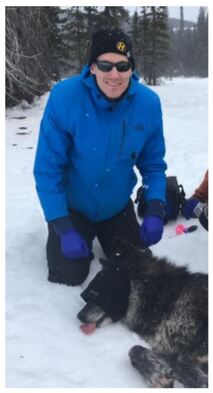|
Bill Harrower - Past President, Treasurer, Communications Chair
Bill Harrower is a Land and Resource Specialist and Registered Professional Biologist with the Caribou Recovery Program of the Terrestrial Species Recovery Branch of the British Columbia Government. He joined the provincial government after owning and operating High-Country Wildlife, a small research consulting firm, for over 20 years. His interests are broad but generally focus on trophic ecology, food webs, ecological niche, population delineation, and other various aspects of species-at-risk conservation and management, including the restoration of trophic structure in ecosystems. Trained as an experimental field biologist, he contributed to several large-scale experiments on species ranging from goshawk and bison to salmon, grassland birds and small mammals. He has been involved in wolverine research and management since the late 1990s and participated in many research and conservation projects throughout western North America. These projects typically involve strategic landscape planning, landscape connectivity, and reconciliation with indigenous peoples. In his role with the BC Public Service, Bill continues the process of doing science to both learn about the world and use science as a tool to help mitigate conflict in resource management and in contributing to co-management of resources with indigenous peoples. Bill has been a leading member of the BC Chapter of TWS since its revitalization in 2018, holding the position of Communications Chair, President, and Treasurer. He is currently an Associate Editor of the Journal of Wildlife Management, a Board Member at the Canadian Section of TWS, and supports the Conservation Affairs Committee at BCTWS. |
|
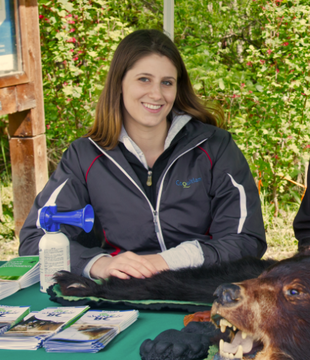
Julie Kanya - Past President (2022)
Previous: Director (Communications)
Julie has been involved with the BC Chapter of TWS since 2017, originally joining TWS to gain more exposure to wildlife professional as an early career professional. She has worked as a public servant focusing on sustainability, natural areas, and environmental protection for the City of Abbotsford and City of Coquitlam as well as in the NGO sector as a stewardship coordinator for a park association.
She is passionate about local wildlife, habitat and ecosystems, particularly in inspiring community members to enhance their lifestyles in manner that benefits both themselves, their families and the local ecosystem (e.g. through stewardship activities, wildlife attractant management, etc.). In addition to wildlife conflict management Julie's skillset also encompasses media relations, conflict resolution, public consultation, research, reporting and data analysis. She hopes to use these skills in her new president-elect role with BCTWS to support reconnection of wildlife professionals post-covid. Outside of the office she's most often biking, trail running, skiing, hiking, camping and generally enjoying the great outdoors followed by a visit to a local brewery!
Previous: Director (Communications)
Julie has been involved with the BC Chapter of TWS since 2017, originally joining TWS to gain more exposure to wildlife professional as an early career professional. She has worked as a public servant focusing on sustainability, natural areas, and environmental protection for the City of Abbotsford and City of Coquitlam as well as in the NGO sector as a stewardship coordinator for a park association.
She is passionate about local wildlife, habitat and ecosystems, particularly in inspiring community members to enhance their lifestyles in manner that benefits both themselves, their families and the local ecosystem (e.g. through stewardship activities, wildlife attractant management, etc.). In addition to wildlife conflict management Julie's skillset also encompasses media relations, conflict resolution, public consultation, research, reporting and data analysis. She hopes to use these skills in her new president-elect role with BCTWS to support reconnection of wildlife professionals post-covid. Outside of the office she's most often biking, trail running, skiing, hiking, camping and generally enjoying the great outdoors followed by a visit to a local brewery!
|
Tyler Muhley - Past President (2021), Secretary, Treasurer & Conservation Affairs Chair
Tyler has over 15 years of experience as a wildlife biologist. He grew up in Hinton, Alberta where he spent a lot of time outdoors and developed a passion for wildlife. He has a PhD and Masters degree in wildlife ecology and management from the University of Calgary. For the last two years he has been working for the provincial government in the Forest Analysis and Inventory Branch. He spent one year as a Director of the Alberta Chapter of the Wildlife Society before he moved to British Columbia. He is excited about the opportunity to grow the British Columbia Chapter of the Wildlife Society and to continue to get to know members of British Columbia’s community of wildlife professionals. |
|
|
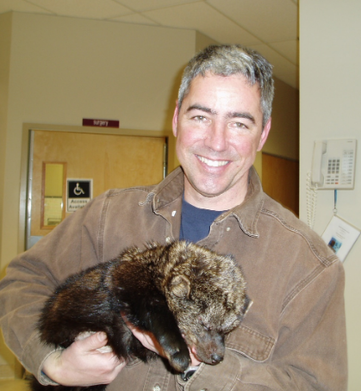
Larry Davis - Past Secretary-Treasurer
Larry joined the BC-TWS in 2019 and has been our Treasurer-Secretary since January 2020. He completed his BSc in 1994 and a MSc in 2009, both at Simon Fraser University. Over the last 25 years, he has worked for the Research section in the Cariboo Region, followed by 8 years employed in a consulting company working primarily for the forest industry. Since 2004, he has been self employed with a diverse portfolio that includes wildlife research, fish inventory, environmental monitoring, environmental impact assessment, and remediation prescriptions. His clients include industry, government, NGOs, and First Nations.
Over the last 15 years, improving habitat management for moose and research on fishers (Pekania pennanti) has dominated his interests. Moose populations have generally been declining across North America, and Larry has developed forest retention standards to improve moose habitat that have been incorporated into Forest Stewardship Plans in the Cariboo Region. Fishers are among the largest obligate cavity users in North America, and his most recent project has focussed on designing an artificial reproductive den box for this red-listed species. Videos on the fisher denbox project can be found on his Youtube channel at: https://www.youtube.com/channel/UCSCwl2j1AJxbzMbD7-6XJHQ
Larry joined the BC-TWS in 2019 and has been our Treasurer-Secretary since January 2020. He completed his BSc in 1994 and a MSc in 2009, both at Simon Fraser University. Over the last 25 years, he has worked for the Research section in the Cariboo Region, followed by 8 years employed in a consulting company working primarily for the forest industry. Since 2004, he has been self employed with a diverse portfolio that includes wildlife research, fish inventory, environmental monitoring, environmental impact assessment, and remediation prescriptions. His clients include industry, government, NGOs, and First Nations.
Over the last 15 years, improving habitat management for moose and research on fishers (Pekania pennanti) has dominated his interests. Moose populations have generally been declining across North America, and Larry has developed forest retention standards to improve moose habitat that have been incorporated into Forest Stewardship Plans in the Cariboo Region. Fishers are among the largest obligate cavity users in North America, and his most recent project has focussed on designing an artificial reproductive den box for this red-listed species. Videos on the fisher denbox project can be found on his Youtube channel at: https://www.youtube.com/channel/UCSCwl2j1AJxbzMbD7-6XJHQ
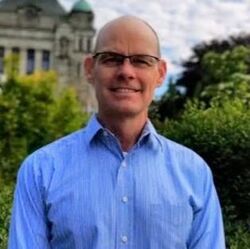
Scott Yaeger
Past President (2019)
Scott Yaeger has been a professional wildlife biologist for more than 25 years, with wildlife research and environmental consulting experiences spanning North America. He holds a B.S. degree in Wildlife Management and an M.S. in Natural Resources from Humboldt State University in California, and secured his R.P.Bio. after moving to British Columbia in 2014. Since relocating to British Columbia, Scott has focused on monitoring, restoration, and reclamation programs associated with energy infrastructure programs and the development of furbearer habitat conservation approaches. After 25 years in our profession, Scott still feels fortunate to have made this his career choice indicating that his satisfaction is in no small part due to his enjoyment of his fellow colleagues. As a long-term member of the Western Section of The Wildlife Society, Scott looks forward to the challenge of launching the British Columbia Chapter and helping it to grow and thrive as an entity where members can find the support, energy, and learning resources they need in pursuit of a rewarding career. Equally important to Scott is to help make the B.C. Chapter fun.
Past President (2019)
Scott Yaeger has been a professional wildlife biologist for more than 25 years, with wildlife research and environmental consulting experiences spanning North America. He holds a B.S. degree in Wildlife Management and an M.S. in Natural Resources from Humboldt State University in California, and secured his R.P.Bio. after moving to British Columbia in 2014. Since relocating to British Columbia, Scott has focused on monitoring, restoration, and reclamation programs associated with energy infrastructure programs and the development of furbearer habitat conservation approaches. After 25 years in our profession, Scott still feels fortunate to have made this his career choice indicating that his satisfaction is in no small part due to his enjoyment of his fellow colleagues. As a long-term member of the Western Section of The Wildlife Society, Scott looks forward to the challenge of launching the British Columbia Chapter and helping it to grow and thrive as an entity where members can find the support, energy, and learning resources they need in pursuit of a rewarding career. Equally important to Scott is to help make the B.C. Chapter fun.
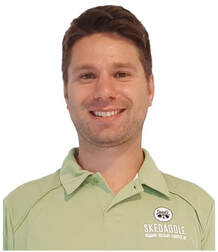
Alex Ritz
Past Director & Newsletter Editor
Alex moved to BC to work in forestry after having completed his Master's of Science in Forestry at Lakehead University following his Bachelor's of Science in Wildlife Biology & Conservation at the University of Guelph, both in Ontario. After a few years working throughout BC's forests, and then a few short contracts with Environment and Climate Change Canada, he is now building a business to solve human-wildlife conflicts in homes as a franchise of Skedaddle Humane Wildlife Control based in Coquitlam to offer preventive solions to promote the humane eviction of wildlife from homes. Alex is keen to be a part of the BC Chapter of the Wildlife Society to connect with other wildlife professionals as a way to stay knowledgeable about wildlife issues both as a professional and as a concerned citizen.
Past Director & Newsletter Editor
Alex moved to BC to work in forestry after having completed his Master's of Science in Forestry at Lakehead University following his Bachelor's of Science in Wildlife Biology & Conservation at the University of Guelph, both in Ontario. After a few years working throughout BC's forests, and then a few short contracts with Environment and Climate Change Canada, he is now building a business to solve human-wildlife conflicts in homes as a franchise of Skedaddle Humane Wildlife Control based in Coquitlam to offer preventive solions to promote the humane eviction of wildlife from homes. Alex is keen to be a part of the BC Chapter of the Wildlife Society to connect with other wildlife professionals as a way to stay knowledgeable about wildlife issues both as a professional and as a concerned citizen.
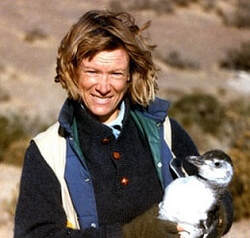
Pat Baird
Past Director & Newsletter Editor
Pat joined The Wildlife Society in 2012 because it enabled her to connect with a broader group of scientists than ornithological or plankton groups, and she liked the integration of so many different fields and the broad and diverse expertise of the members. She is currently a Research Associate at Simon Fraser University and director of Kahiltna Research Group. She has conducted research on seabird ecology and food web structure throughout the world, from Alaska to Argentina and Hawaii to France on species such as tufted puffins, kittiwakes 4 species of gulls, 3 species of terns, Magellanic penguins, to western sandpipers and the anchovies, sandlance, and herring and diatom species they consume.
Pat was a professor in the Biology Department at California State University before she moved to Canada, and she and her students focused on many aspects of ecology, especially foraging dynamics and the food web of seabirds, and also on habitat assessment and long-range planning for nonprofits and governmental groups. Pat has been an officer on the board of the Pacific Seabird and The Waterbird Groups, and organized science workshops for the Society for Women in Science & Technology. In her spare time she backpacks and cross-country skis, and enjoys exploring countries all over the planet with or without her family.
Past Director & Newsletter Editor
Pat joined The Wildlife Society in 2012 because it enabled her to connect with a broader group of scientists than ornithological or plankton groups, and she liked the integration of so many different fields and the broad and diverse expertise of the members. She is currently a Research Associate at Simon Fraser University and director of Kahiltna Research Group. She has conducted research on seabird ecology and food web structure throughout the world, from Alaska to Argentina and Hawaii to France on species such as tufted puffins, kittiwakes 4 species of gulls, 3 species of terns, Magellanic penguins, to western sandpipers and the anchovies, sandlance, and herring and diatom species they consume.
Pat was a professor in the Biology Department at California State University before she moved to Canada, and she and her students focused on many aspects of ecology, especially foraging dynamics and the food web of seabirds, and also on habitat assessment and long-range planning for nonprofits and governmental groups. Pat has been an officer on the board of the Pacific Seabird and The Waterbird Groups, and organized science workshops for the Society for Women in Science & Technology. In her spare time she backpacks and cross-country skis, and enjoys exploring countries all over the planet with or without her family.
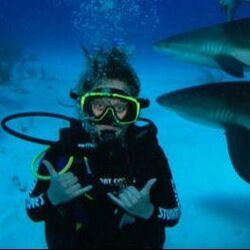
Ashley Kerik
Past Director
As the Student Director for the BC chapter of TWS, Ashley links university students with working wildlife biologists. She was also the outreach coordinator and secretary for the UBCO TWS Chapter for the last two years. Ashley recently completed a BSc (Hons) in Zoology at UBCO. Her undergraduate honours thesis project focuses on the distribution of freshwater sponges in the Okanagan area. Ashley also spent last summer at Bamfield Marine Sciences Centre studying marine behavioural ecology and survey methods of coastal wildlife. Prior to starting her undergraduate degree, Ashley spent 7 years traveling and working abroad. She has lived in over 8 countries and traveled to many more. She loves to be outdoors, especially when it involves diving. Ashley plans to obtain a graduate degree focusing on marine conservation. She is interested in understanding trophic cascades and is fascinated with sharks. Ashley is determined to be a major part of the ocean conservancy community and plans to spend her life researching, understanding, and educating others on the issues our oceans are facing.
Past Director
As the Student Director for the BC chapter of TWS, Ashley links university students with working wildlife biologists. She was also the outreach coordinator and secretary for the UBCO TWS Chapter for the last two years. Ashley recently completed a BSc (Hons) in Zoology at UBCO. Her undergraduate honours thesis project focuses on the distribution of freshwater sponges in the Okanagan area. Ashley also spent last summer at Bamfield Marine Sciences Centre studying marine behavioural ecology and survey methods of coastal wildlife. Prior to starting her undergraduate degree, Ashley spent 7 years traveling and working abroad. She has lived in over 8 countries and traveled to many more. She loves to be outdoors, especially when it involves diving. Ashley plans to obtain a graduate degree focusing on marine conservation. She is interested in understanding trophic cascades and is fascinated with sharks. Ashley is determined to be a major part of the ocean conservancy community and plans to spend her life researching, understanding, and educating others on the issues our oceans are facing.

